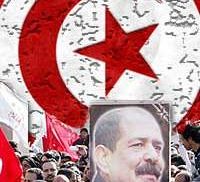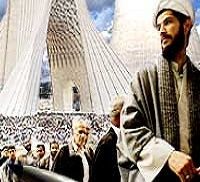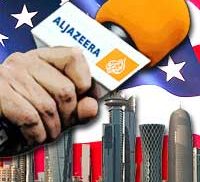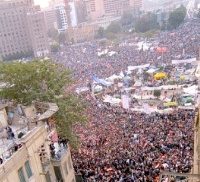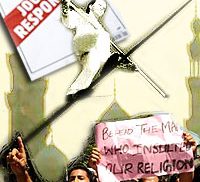This dossier stems from the debate sparked by Elizabeth Suzanne Kassab’s article—which opens this collection—on the transformation of the Arab intellectual scene after 2011. Her notion of a “new contemporary” in Arab thought prompted a series of contributions that do not aim to offer solutions, but rather to raise new questions, probe unresolved issues, and put forward critical perspectives. Bringing together Kassab’s essay and two related pieces, the dossier explores how Arab thought is redefining itself in light of the uprisings, the failures of political transitions, and the moral and intellectual rupture marked by Gaza.
Dossiers
- Despite the political crisis that reigns in Tunisia since February 6, the day of opposition leader Chokri Belaid’s murder, according to Slaheddine Jourchi “the country still has real possibilities of constructing an emancipated and civil State”. Jourchi is a journalist, researcher, one of the best Tunisian political experts, human rights activist and since February 13, one of sixteen chosen for the Council of Elders, nominated to find solutions to the political chaos instilled after Belaid’s death. Reset-Dialogues has interviewed him.
- Iran is preparing for the June presidential elections and its situation seems to be increasingly complex. While the international community still has many doubts about the country’s nuclear programme and many believe a compromise is out of reach, inside a country harshly affected by sanctions, civil society suffers ad would like to see change that is not coming. Centre stage is taken up by disagreements Ahmadinejad and the Supreme Guide, which are becoming increasingly conflicting, while reformists are excluded from the main political debate.
- “We will demonstrate to Americans that this is the kind of journalism they can appreciate”, Al Jazeera America spokesman Stan Collender told ResetDOC, praising the new adventure the Qatari network has embarked upon in the United States, buying Al Gore’s Current TV. However, while Qatar and its media are opening out to the world and to the West, there are still many challenges posed to freedom of the media and of expression in the small Gulf emirate. Is anyone trying to resolve the matter? And how? We asked Jan Keulen, director of the Doha Centre for Media Freedom.
- On Tuesday 22 January 2013 Israelis have gone to the polls to elect a new parliament and government. Despite the tight race between the center-left and the right wing, the vote is expected to usher in a government which will shift Israel further to the right and Benjamin Netanyahu is widely believed to retain his post, forming a coalition with a grouping of nationalist, religious and orthodox parties. This probable outcome rises the prospect of a greater diplomatic isolation for Israel and the chances of a peace deal with the Palestinians are likely to fade. For many, it seems that the only hope for improvements lay outside the domestic Israeli/Palestinian setting: maybe within Europe?
- Reset-Dialogues’ Intercultural Lexicon is back to bridge the cultural gaps, controversies and misunderstandings surrounding a large number of concepts pertaining to the political, cultural, moral, and religious discourse. A new video and Andrew Arato‘s new definitions of Civil society, Revolution and Constitution, will help us understand key events of our time: from civil society coming back to politics in Tahrir and Occupy, to the Arab Spring’s first constitutional outcomes, from Europe witnessing an unprecedented crisis in its political legitimacy to America’s divisions over the First and Second Amendments.
- The Sandy Hook Elementary School shooting is a tragedy that obliges us to question the relationship between freedom and security, between democracy and violence. Political theorist Benjamin Barber and Jim Sleeper from Yale explain why, at last, the American establishment should find the courage to defy society’s steadily advancing culture of death and to confront the powerful gun lobby that fuels and exploits it. For Giancarlo Bosetti, the discussion on the relationship between the use of freedom and responsibility aroused by this terrible event can also help us better understand the challenges newborn Arab democracies will soon have to face.
- The political transition in Egypt continues to unfold through a series of events, many of them surprising and unforeseen. While waiting for the final results of this week’s constitution referendum to come in, Reset-DOC has asked former Italian Ambassador to Egypt Francesco Aloisi de Larderel to explain uns what is happening.
- With violence once again prevailing over dialogue in Israeli-Palestinian relations, Reset-DoC still believes that a fair and lasting solution can and must be found as quickly as possible. Andrea Dessì from the Istituto Affari Internazionali (IAI) in Rome has asked five leading Israeli, Palestinian and international experts to explain us how.
- How should one assess the reaction sparked by violent minorities when faced with provocative events, such as the recent, outrageous and insulting film on Islam? And on the basis of what criteria should we understand these same events and the strategies they conceal? These and many other questions are answered by Nilüfer Göle (EHESS, Paris), Jytte Klausen (Brandeis University), and by Asmaa Mahfouz, the young Tahrir Square blogger and activist.
- The “Innocence of Muslims” case has caused reactions all over the Arab world, ranging from legitimate condemnation of the offensive film to extremist violence that led to the death of U.S. Ambassador in Libya. Almost two years after the Arab Spring uprisings and a few weeks before the American presidential elections, there are still many unknowns concerning the future of the newborn Arab democracies and their relations to the West; and just as many challenges to be faced by the United States’ diplomacy. Karim Mezran from the Rafik Hariri Center for the Middle East of the Atlantic Council of the United States explains why.



